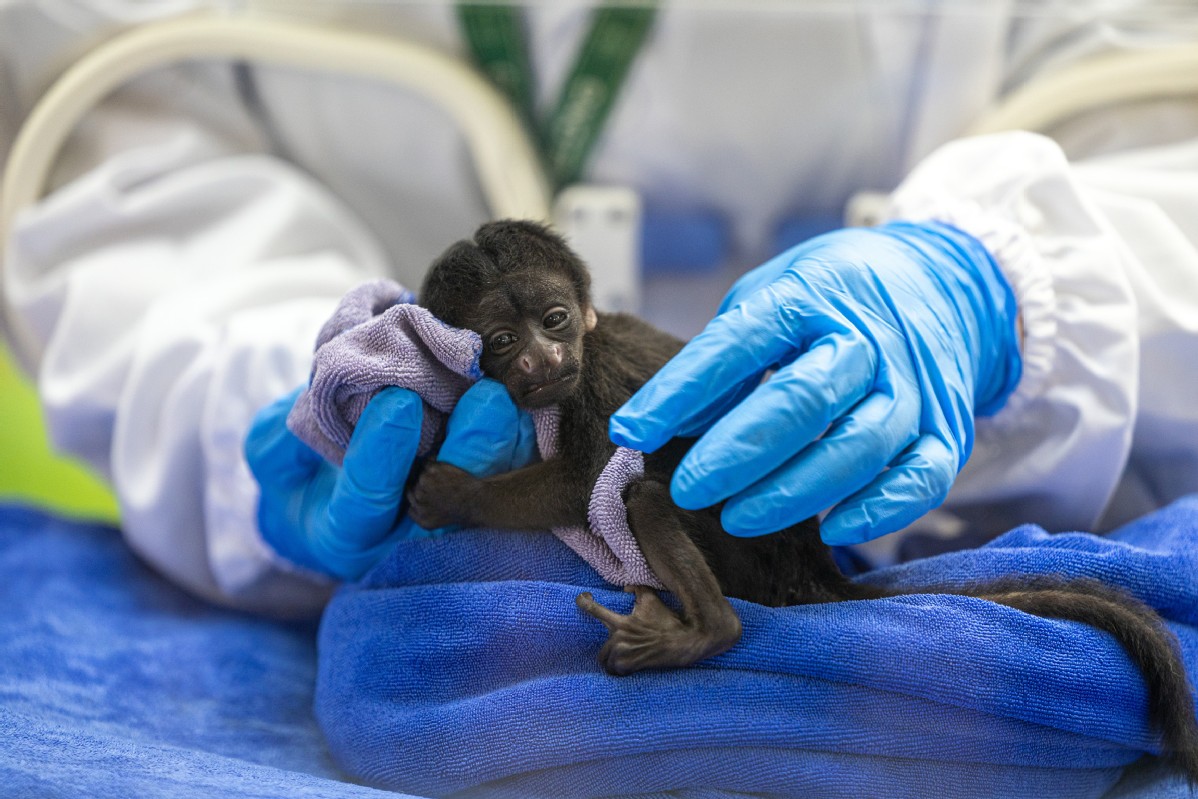Black bush-tailed monkey born in Guangdong


A black bush-tailed monkey was recently born in a forest park in Qingyuan, Guangdong province, marking a significant advancement in China's conservation and breeding efforts for critically endangered species.
Under the care of the conservation team at Chimelong Forest Kingdom in Qingyuan, the infant monkey is in good health and is consuming 6 milliliters of milk powder per feeding, according to the forest park.
The monkey is one of the most endangered primate species in the world, classified as critically endangered by the International Union for Conservation of Nature. Due to habitat destruction and illegal hunting, there are currently less than 250 black bush-tailed monkeys in the world.
The animal is a medium-sized primate, characterized by thick, dark brown, or black fur covering from the head to the shoulders, with short and flat noses and silver-white cheek hair growing around the cheeks of males.
In China, the rare primate species can only be found at the Chimelong Forest Kingdom in Qingyuan, which boasts the largest artificially bred population of the species in the country.
Shortly after birth a month ago, a male monkey in the park suddenly snatched the infant, leading to the forced separation of the mother and baby and preventing the newborn from nursing normally.
To ensure the infant's survival, the conservation team promptly initiated the artificial feeding plan, taking turns to care for the infant around the clock and simulating maternal feeding behaviors by using a specialized milk formula and maintaining its health with warming equipment.
Despite just turning one month old, the infant has already inherited the distinctive features of its parents, according to the conservation team.
"Initially, the infant was very weak, but after two weeks of close monitoring, its weight steadily increased and its activity noticeably improved," said Kan Tao, a conservationist of the park.
The infant now weighs 229 grams and is fed six times per day, according to Kan.
Breeding black bush-tailed monkeys poses extreme challenges and the success of artificially rearing the primate has accumulated valuable experience for future research, according to Yang Handong, general manager of Chimelong Forest Kingdom in Qingyuan.
The conservation team will gradually attempt to reintegrate the infant monkey into the population while promoting the recovery of their natural behavior through behavioral training.
The forest park has successfully conserved a large family of over 58 primate species, setting a record for the most diverse conservation of primates globally, according to Yang.
"This achievement demonstrates our capabilities in wildlife conservation and showcases China's progress in the conservation of critically endangered species," said Yang.
The park will continue to strengthen international cooperation to promote the recovery of the species' population and further expand its leading advantage in primate conservation.
Currently, the black bush-tailed monkey family resides in the primate-exclusive exhibition area in the park. Once the infant monkey adapts to group living, it will be introduced to the public at the appropriate time.
"Visitors will not only have the opportunity to observe this rare species up close but also learn about the significance of global biodiversity conservation through engaging and diverse educational presentations," said Yang.
In addition to breeding the black bush-tailed monkey, the forest park in Qingyuan, as an important base for wildlife conservation in China, has successfully bred a variety of endangered animals, including South China tigers and golden takins.
- Black bush-tailed monkey born in Guangdong
- Measles and rubella cases remain at low level, epidemic expert says
- Sinan Mansions to host nature-themed events during Shanghai International Flower Show
- Shanghai Natural History Museum unveils ambitious plans
- Former Xinjiang political advisor stands trial for bribery
- Lingshui unveils investment potential at global expo



































